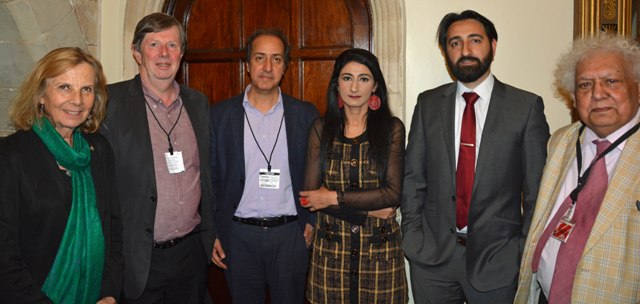 CJA panellists Victoria Schofield, Andrew Whitehead, Tahir Aziz, Nitasha Kaul, Muzzamil Ayub Thakar, and Lord Desai. [Photo by Martin Lumb]
CJA panellists Victoria Schofield, Andrew Whitehead, Tahir Aziz, Nitasha Kaul, Muzzamil Ayub Thakar, and Lord Desai. [Photo by Martin Lumb]
[This article has been written for the Commonwealth Journalists Association and kindly shared with the Round Table.]
Kashmir has been a source of tension in south Asia since Partition in 1947. The mountainous Muslim-majority state has been the cause of two of the three wars fought by India and Pakistan, as well as numerous smaller flare-ups between the nuclear-armed neighbours.
On the Indian side of the ceasefire line established 70 years ago – the Line of Control (LoC) – events have followed a regular cycle of demands for greater autonomy or independence, armed clashes with insurgents and infiltrators from Pakistan, security crackdowns and bouts of direct rule from Delhi. But this sequence was dramatically interrupted on August 5, when India’s Bharatiya Janata Party (BJP) government announced that it was abolishing Kashmir’s special status under Article 370 of the constitution.
Simultaneously, virtually every political and community leader in Kashmir was detained and most communications cut off, making it extremely difficult for the outside world to learn what was happening in the Kashmir Valley, where most of the population lives. This state of affairs still prevailed more than a month later, when a panel of experts met at the Commonwealth Parliamentary Association in the House of Commons, London, to assess Kashmir’s prospects.
The panel, invited by the Commonwealth Journalists’ Association, saw the Indian government’s intervention as a decisive break with the past, but one that gave scant cause for optimism about the future. Chairing the meeting, John Elliott, a journalist and author based in India for many years, pointed out that there had been no consultation with the local assembly. The outcome, he said, was a population which had been alienated yet further, and heightened tension with Pakistan.
By abolishing restrictions on outsiders buying property in Kashmir, the BJP said it would bring development in the state, a policy the Labour politician Lord Desai described as an attempt to “buy the loyalty” of the inhabitants. Nitasha Kaul, a Kashmir-born academic, writer and poet, said Delhi was claiming to “liberate” Muslim women in the Valley, adding: “Kashmir is a nation, though it doesn’t have a state of its own.
“Creating a choice between development and freedom is a standard script of colonialism. India cannot claim there is any democracy if there is no consultation. The arbitrariness is another measure of colonialism.”
Andrew Whitehead, a former BBC correspondent in south Asia and author of a book on Kashmir, agreed that there could no longer be any pretence that India ruled Kashmir by consent. The territory had great autonomy in theory, but this had been “hollowed out” to the point that it had less autonomy than any other Indian state.
Muzzamil Ayub Thakar, president of the exile World Kashmir Freedom Movement, said some 30,000 people were reported to have been detained. India had deployed about a million security forces among a population of 10 million, proving that “the people of Kashmir don’t matter, it is the territory that matters”.
Desai argued that by removing Kashmir’s special status, Delhi had made the Line of Control India’s border, and with that, “Partition is finally complete”. Others responded that this was not a final resolution of the issue. Tahir Aziz, south Asia programme director of Conciliation Resources, who was born on the Pakistani side of the LoC, said the conflict had been a long one, and the present crisis too would eventually pass. “There has to be a space, a process to bring apparently irreconcilable views together,” said Aziz, but other speakers saw little prospect of a negotiated settlement.
India had locked up Kashmir’s people while deciding their future, said Victoria Schofield, a historian and author of several books on south Asia, including two on Kashmir. When they were allowed out, she feared they would be angry: “Young people in Kashmir feel they have no option or future but to pick up a gun.” Hindu nationalism was destroying diversity in India, “such a multi-cultural society”.
Though other seemingly intractable conflicts in East Timor, South Sudan and Northern Ireland had found resolution, Whitehead pointed out that in the last of these, Sinn Fein, the political wing of the IRA armed faction, had been allowed to operate throughout the Troubles. India, meanwhile, had detained two former Chief Ministers of Jammu and Kashmir, Farooq Abdullah and his son Omar, both of whom had served in national governments – in Omar’s case, a BJP-led administration. This was the equivalent of locking up the Unionist leadership in Northern Ireland.
Despite having had peacekeepers in Kashmir since 1949, Whitehead added, the United Nations was not active in the dispute. Its last resolution on Kashmir was in 1971. As for Britain, while there was no point in seeking to mediate, it could keep Kashmir on the international agenda. But Aziz stressed that there could never be an international solution to the Kashmir issue, “only a local one”.
Raymond Whitaker is a former Asia Editor of The Independent and Foreign Editor of The Independent on Sunday. He is a member of the CJA-UK executive.
Related articles:
Constitutional coup ends Kashmir’s historic rights
India’s 2019 General Election: National Security and the Rise of the Watchmen
India’s Elections: ‘Dismal’ voter turnout out in Jammu and Kashmir



